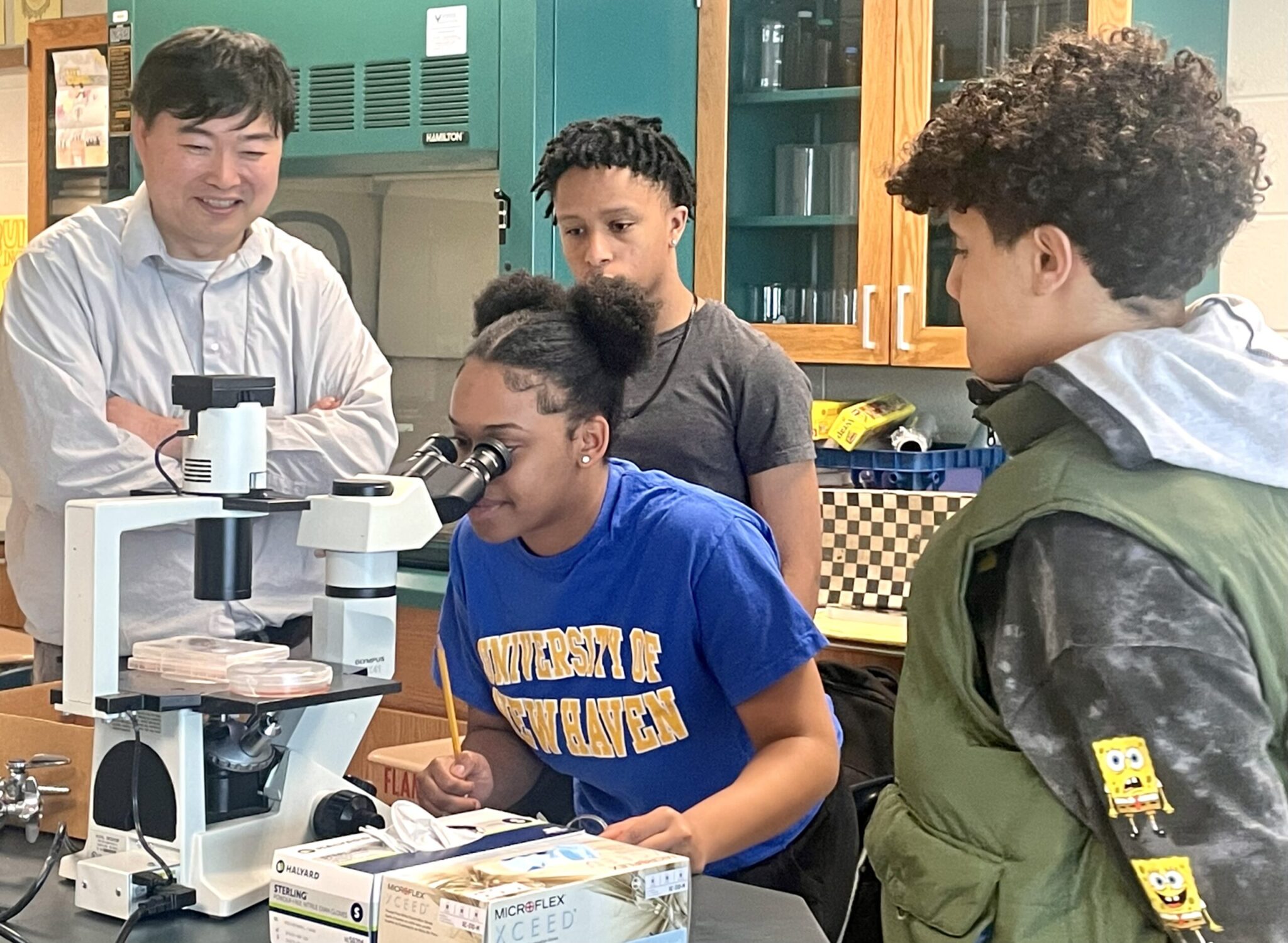Local high school’s BioScience Club introduces students to careers in science
Career High School teacher Huan Ngo runs the 20 person club alongside Yale Professor Jun Lu in a collaboration with the Yale Stem Cell Center and the Yale Department of Genetics.

Courtesy of Huan Ngo
Capitalizing on the emerging BioScience industry in New Haven, Huân Ngô is working to equip his students from Hill Regional Career High School with the skills necessary to enter into the industry.
New Haven’s widening wealth inequality gap makes it more challenging for low-income students to prepare for college admissions, a challenge that Ngô, a science teacher at Career High School, said he believes could be mitigated by focused educational endeavors.
“The evolution of biosciences makes it such that it is easy to leave children, especially minority children, behind,” Ngô told the News. “The city continuously introduces efforts similar to those that failed in the past. It’s time for a new approach — to build knowledge from the ground up, teaching the fundamentals as we move along.”
To establish this new educational approach, Ngô reached out to professor Jun Lu at the School of Medicine to curate a program between Career and the University aimed at improving the current structure of science education.
In an interview with the News, Lu recalled one of his first conversations with Ngô, during which he said he learned that New Haven’s science education is ranked near the bottom in state testing performance compared to other cities and county school districts in the state.
“I wanted to create a sense of excitement to go into the sciences,” Lu said. “I want to make those bright students see the utility of a science degree.”
The two collaborated to pilot the Career High BioScience club in May 2023, introducing students to information about stem cells, chromosomes, molecular function, genetic variation, restriction enzymes and antibodies.
The program will run in five-week cycles, with a total of three cycles per school year. The first, which is currently underway, is in collaboration with the Yale Stem Cell Center. The second will be designed around a curriculum from the Yale Genetics lab and the third will tentatively run with the Yale Center for Clinical Investigation.
These after-school programs give students hands-on experience otherwise not available in the standard high school science curriculum, including how to perform DNA amplification and gel electrophoresis, as well as how to use antibodies to visualize proteins in cells.
With teaching local high schoolers these skills, Career physics teacher Spencer Evans and math teacher Matthew Cacopardo, along with Yale graduate students Rebecca Starble GRD ’24 and Cara Ly GRD ’28, all commented on their hopes to improve the “broken pipeline” that exists within the education system. They said they hope the program might help to alleviate the roadblocks currently present in the pursuit of science, technology, engineering, mathematics and medicine — STEMM — careers.
“While becoming a scientist should be a career that is available to everyone, unfortunately there are huge systemic and institutional barriers that prevent so many inquisitive students from even thinking that this is a career available to them,” Starble wrote to the News.
The program’s leadership team said they hope that students can get an indication of whether or not they would like to advance towards a BioScience career, and if so, lay out the process of accomplishing those goals.
Students of the BioScience Club were quick to affirm these goals, unanimously agreeing that the program enriched their career search by both exposing them to essential content and providing the opportunity to interact with experienced professionals in the fields they aspire to join.
Luis Rivera, a student from last year’s inaugural cycle of the BioScience club, said that he greatly appreciated the chance to discuss his interests with the graduate students.
“I finally learned what cancer actually was and how it worked within the body,” Rivera said. “I’m not necessarily interested in cancer research, but it was still amazing to be able to ask my questions and receive such intriguing responses.”
Students from both last year’s and this year’s cohorts said that they found an elevated dedication to STEMM education following their involvement in the BioScience club.
Sayvion Sealey, another student from last year’s cycle, explained the ways in which the BioScience club deviated from his previous STEMM classes.
“I’m the type of student who likes hands-on, interactive work, and most courses that we’re required to take in high school are by the book, taught strictly with books, and I really wanted to break away from that,” Sealey said.
The first session of the BioScience Club will conclude with a Family STEMM night on Oct. 26 at Hill Regional Career High School, where the students will have the opportunity to showcase their new skills to their family and friends.
Correction, 10/8: A previous version of this article referred to the Yale Department of Genetics as the Yale Center of Genetics.
Update, 11/11: The article was updated to reflect that Lu and Ngô discussed New Haven’s ranking in state testing performance.







